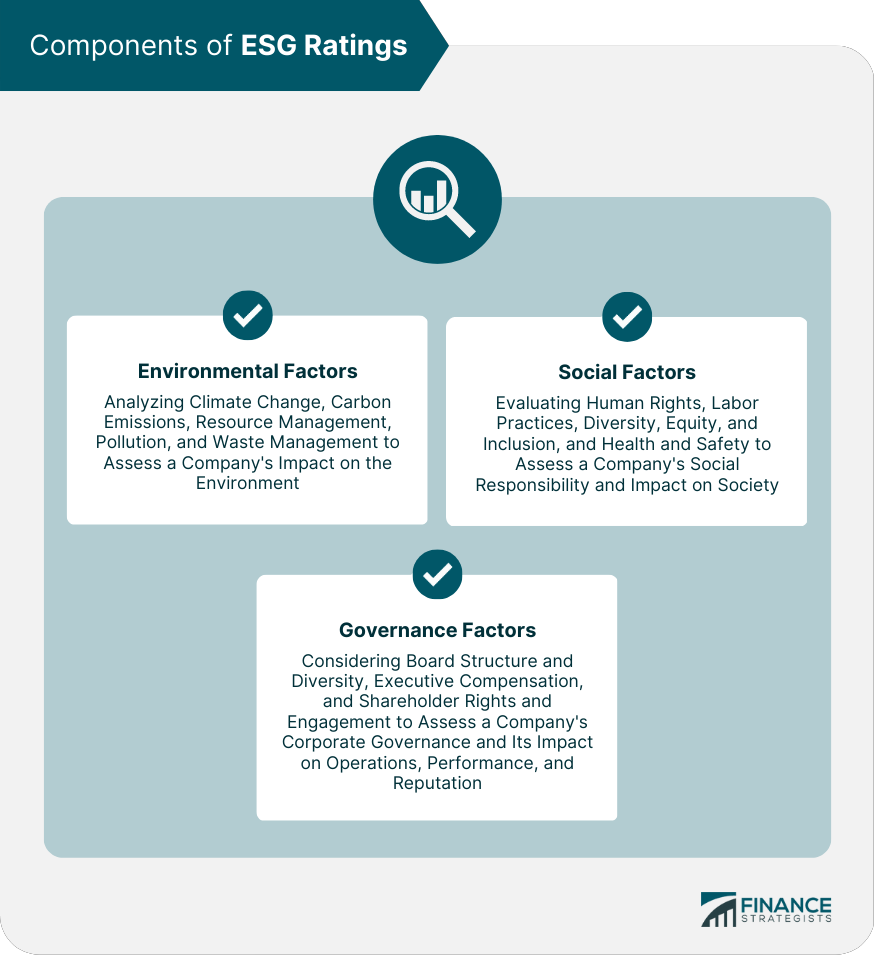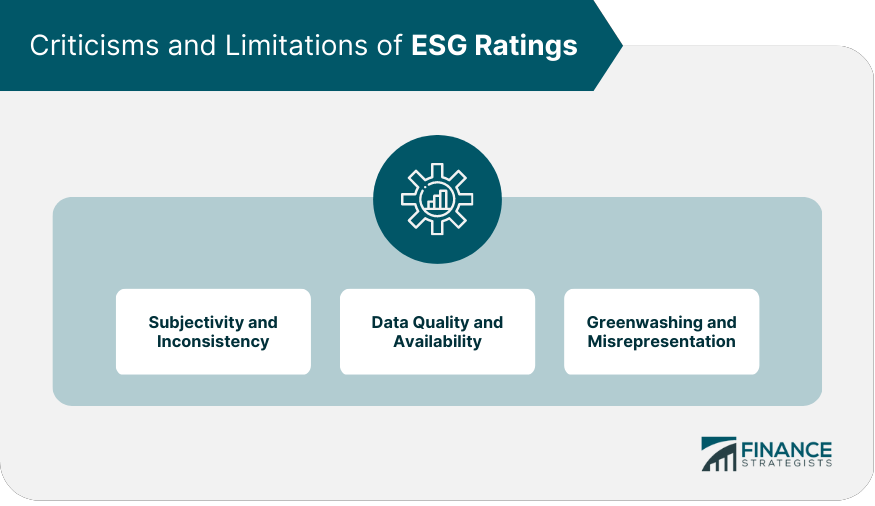ESG ratings are a tool used to evaluate the sustainability and social responsibility of companies. The acronym ESG stands for Environmental, Social, and Governance, and these factors are used to assess how companies manage risks and opportunities related to sustainability issues. ESG ratings evaluate companies based on how well they manage these ESG factors, with the goal of assessing the long-term sustainability of their business practices. Investors and other stakeholders can use these ratings to compare the sustainability performance of different companies and make informed investment decisions. ESG ratings have become increasingly important in recent years as investors and other stakeholders demand more transparency and accountability from companies on non-financial issues. By incorporating ESG factors into their investment decisions, investors can help promote sustainable business practices and mitigate risks associated with environmental and social issues. ESG ratings are a critical tool for investors and other stakeholders who are interested in evaluating a company's environmental, social, and governance (ESG) performance. These ratings provide an overall assessment of a company's ESG practices and can help investors identify companies that are well-managed and financially sustainable. ESG ratings are important because they help investors understand the risks and opportunities associated with investing in a particular company. ESG ratings can also help companies improve their ESG performance. By providing a benchmark against which companies can compare their ESG practices, ratings can help companies identify areas for improvement and make changes that will benefit both their stakeholders and their bottom line. Additionally, companies with higher ESG ratings may have an advantage in attracting and retaining talent, as more and more employees are looking for employers who are committed to sustainability and social responsibility. Moreover, ESG ratings have become increasingly important in the wake of global sustainability challenges, such as climate change and social inequality. As stakeholders demand greater transparency and accountability from companies, ESG ratings provide a standardized framework for evaluating a company's ESG practices. This, in turn, can help companies better manage risks associated with ESG issues and identify opportunities for sustainable growth. There are several components included in Environmental, Social, and Governance ratings. ESG ratings consider a company's impact on the environment by analyzing factors such as climate change and carbon emissions, resource management, and pollution and waste management. These factors are evaluated based on their potential impact on the environment, including risks and opportunities. ESG ratings also take into account a company's social responsibility by evaluating factors such as human rights and labor practices, diversity, equity, and inclusion, and health and safety. These factors are assessed based on their potential impact on society, including the company's stakeholders. ESG ratings also consider a company's corporate governance, including factors such as board structure and diversity, executive compensation, and shareholder rights and engagement. These factors are evaluated based on their potential impact on the company's operations, performance, and reputation. There are several agencies which provide ESG rating services and there are various methodologies they use to assess companies. There are several rating agencies that provide ESG ratings, including MSCI ESG Research, Sustainalytics, and ISS ESG. These agencies evaluate companies based on different criteria and methodologies, resulting in varying scores and ratings. ESG rating agencies use various methodologies to assess companies, including quantitative and qualitative analysis, analysis of ESG controversies and incidents, and industry and company comparisons. These methodologies aim to provide a comprehensive assessment of a company's ESG performance. Below are some details regarding the relationship between ESG ratings and investment decision-making. ESG ratings play an increasingly important role in investment decision-making, with many investors incorporating ESG ratings into their portfolio construction process. This is driven by the belief that companies with strong ESG performance are more likely to deliver sustainable long-term returns. Research has shown a positive correlation between a company's ESG performance and its financial performance, including its stock price and profitability. This suggests that companies that prioritize ESG performance are more likely to deliver sustainable long-term value to their shareholders. The regulatory environment is also evolving to require greater ESG disclosure from companies. This is driven by a growing recognition of the importance of ESG factors in assessing a company's performance and the potential risks and opportunities associated with them. There are several criticism and limitations of ESG Ratings, including the following: One criticism of ESG ratings is that they are subjective and inconsistent, with different rating agencies often providing different scores and ratings for the same company. This is partly due to the different methodologies used by rating agencies and the varying importance placed on different factors. Another criticism of ESG ratings is that the quality and availability of ESG data can be limited, making it difficult to accurately assess a company's ESG performance. This is particularly true for smaller companies and those operating in emerging markets. A final criticism of ESG ratings is that they can be subject to greenwashing and misrepresentation, with companies claiming to have strong ESG performance without actually delivering on their promises. This highlights the importance of verifying a company's ESG performance through independent analysis and verification. Technological innovations, such as artificial intelligence and big data, are increasingly being used to improve the accuracy and objectivity of ESG ratings. These technologies can help to address some of the limitations of ESG ratings by providing more comprehensive and reliable data on a company's ESG performance. There is a growing recognition of the importance of global initiatives and standardization in promoting sustainability and improving ESG ratings. Initiatives such as the United Nations Sustainable Development Goals and the Task Force on Climate-related Financial Disclosures (TCFD) are driving greater transparency and disclosure on ESG factors. Impact investing, which aims to generate positive social and environmental impact alongside financial returns, is increasingly using ESG ratings as a way of assessing companies' impact and sustainability performance. ESG ratings are a tool that evaluates a company's sustainability and social responsibility based on its management of environmental, social, and governance factors. ESG ratings are important for investors and stakeholders interested in evaluating a company's long-term sustainability and financial performance. These ratings can also help companies improve their ESG practices and attract talent committed to sustainability and social responsibility. ESG ratings comprise several components, including environmental, social, and governance factors. Several rating agencies, including MSCI ESG Research, Sustainalytics, and ISS ESG, provide ESG rating services using various methodologies, and investors use these ratings to inform their investment decisions. While ESG ratings have limitations and criticisms, including subjectivity, inconsistency, and greenwashing, they remain a useful tool for assessing a company's ESG performance and promoting sustainable business practices.Definition of ESG Ratings
Importance of ESG Ratings
Components of ESG Ratings
Environmental Factors
Social Factors
Governance Factors

ESG Rating Agencies and Methodologies
Leading Rating Agencies
Rating Methodologies
ESG Ratings and Investment Decision-Making
Role of ESG Ratings in Portfolio Construction
ESG Ratings and Corporate Performance
Regulatory Environment and ESG Ratings
Criticisms and Limitations of ESG Ratings
Subjectivity and Inconsistency
Data Quality and Availability
Greenwashing and Misrepresentation

Future of ESG Ratings and Sustainability
Bottom Line
ESG Ratings FAQs
ESG ratings are a metric used to evaluate a company's environmental, social, and governance performance, with the goal of promoting sustainable practices.
Several rating agencies provide ESG ratings, including MSCI ESG Research, Sustainalytics, and ISS ESG, among others.
ESG ratings evaluate a company's environmental impact, social responsibility, and corporate governance. This includes factors such as climate change, human rights, and board diversity.
ESG ratings are used by investors to assess a company's potential risks and opportunities, with the belief that companies with strong ESG performance are more likely to deliver sustainable long-term returns.
ESG ratings have been criticized for their subjectivity, data quality, and potential for greenwashing. However, technological innovations and global initiatives are driving greater transparency and standardization in ESG ratings.
True Tamplin is a published author, public speaker, CEO of UpDigital, and founder of Finance Strategists.
True is a Certified Educator in Personal Finance (CEPF®), author of The Handy Financial Ratios Guide, a member of the Society for Advancing Business Editing and Writing, contributes to his financial education site, Finance Strategists, and has spoken to various financial communities such as the CFA Institute, as well as university students like his Alma mater, Biola University, where he received a bachelor of science in business and data analytics.
To learn more about True, visit his personal website or view his author profiles on Amazon, Nasdaq and Forbes.











